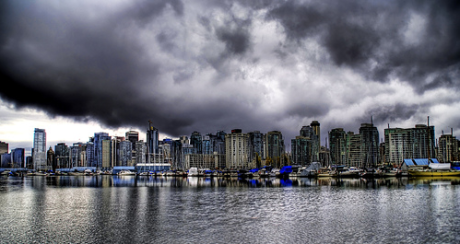
Does it feel like it's been a crummy summer to you?
Here on Vancouver Island, the summer of '08 stayed in the wings through most of June, showed its smile briefly in July, then stepped back behind chilly curtains of cloud and rain again through most of August.
We're not alone. Alaska is on track to shiver through the fewest summer days with temperatures above 65 F (18.3 C) on record. The U.S. Midwest experienced its latest snow on record this spring, one cause of those big summer floods. And maybe you remember our own snow last winter, not to mention the roofs buckling under the drifts in Quebec.
Brace yourself for a fresh round of nay-saying about "so-called global warming," and accusations of "hysteria" directed at those who forecast dramatic climate change in our near future. These sprout like mushrooms every time some weather headline plays against the stereotype of a planet getting steadily warmer and drier.
And it's true that 2008 has been a colder-than-we're-used-to (lately) year for North America. In fact, there is a good chance that the next few years will be much like it. But it's not because the laws of thermodynamics have suddenly changed.
One cold, wet summer -- or even several in a row -- does not mean global cooling has begun. Deluding ourselves into thinking it has would be dangerous indeed. Especially so on the eve of an election that may turn on Canada's climate strategy.
The ocean as bathtub
The reason we so easily fall for these kinds of delusions, and why willfully short-sighted pundits persist in exploiting them, is that they confuse a few days, or weeks or even months in one place on earth, for the fluid continuum of swirling air and water that constitutes our planet's atmospheric and ocean system.
Put simply: the planet may be colder for the moment here, but it is certain to be warmer somewhere else.
Short-sighted climate ostriches have reported that according to the U.S. National Climate Data Center, global average temperatures dipped between 1998 and 2005. Fox News took pleasure earlier this year in noting that four teams tracking global surface temperatures had noticed a drop "large enough to erase nearly all the global warming recorded over the past 100 years."
What such reports overlook is that global surface temperature estimates are based overwhelmingly on observations of air temperature. As a matter of physics, the atmosphere holds relatively little of the extra heat building up inside Earth's greenhouse-gas shell.
Most of that heat is being absorbed into the oceans (accounting, incidentally, for about half the rise in ocean levels worldwide, as warmer water molecules expand). But science has relatively few tools for measuring ocean temperature, or factoring the heat stored there the average global temperature.
The oceans themselves are big places, and not uniform. Sometimes warmer water sits on top of a cooler mass (a description of the El Niño phenomenon in the eastern Pacific). Sometimes colder water covers the surface (La Niña). Whichever one is uppermost has much more impact on the easily influenced surface air temperature and current weather over the continents, than does the heat absorbed and temporarily locked away in submerged ocean layers.
Niño and Niña, troublesome twins
That's what's happening now. Early 2008 experienced a sharp, cold La Niña. The chilly, wet northern non-summer we've experienced since then was fully foreseeable and foreseen as a consequence.
The Niño twins alternate over periods of three to eight years. Other more mysterious cycles run over much longer periods. But the two most important of these, as it happens, seem to be flipping from warm states to cooler ones.
Two or three times a century, a vast swirling lagoon of slightly warmer water forms in the western Pacific and over two or three decades drift up past Alaska and dissipates west of the Queen Charlotte Islands. Just such a cycle (known as the Pacific Decadal Oscillation) ended a couple of years ago, leaving cooler water exposed and chilling the air over millions of square miles of ocean. The same air that will follow the prevailing winds to the B.C. coast.
In the Atlantic meanwhile, the northernmost loop of a much larger current that swings across both oceans similarly surges and weakens over periods of decades. When the current runs faster, temps across eastern North America and Europe rise for years on end. But the current has been weakening, and some scientists think the so-called Atlantic Multidecadal Oscillation may be poised to slip into its slower "negative" state -- bringing temps down again for a few years.
If that happens, and the rapid warming of the 1990s and early '00s takes a break for the next few years, it will be easy for North Americans and Europeans to relax their concern, and perhaps even to think that the ostriches may have been right.
When the rubber band snaps back
But the heat is still building up. It may be trapped for the moment, perhaps even for a few years to come, in tropical oceans or deeply submerged layers of the sea. But it is not gone.
Sooner or later, that heat will out. And when it finally does break out into the near-surface atmosphere where weather happens and we live, its effect will be like the elastic we've stretched to the limit and released: too likely to snap us in the eye.
That snapback moment will come, British scientists calculate, around the middle of the coming decade.
What then?
When these huge sea-cycles perform their next oscillation, as they must, and begin to pass all the heat energy that's been stored up temporarily in the deep or tropical oceans through to North America, we will get to experience new categories of extremes at the other end of the scale: exhausting series of droughts and scorching heat-waves.
In the meantime, while we may enjoy a relative cool, in those parts of the world where the heat is building up, it will drive increasingly violent storms (witness, currently, northeast India).
One particularly myopic commentator claimed recently in the right-wing Canadian Free Press that Russia's aggression in Georgia has put a "nail in the coffin of climate change hysteria." The truth is that Georgia, like Iraq and Afghanistan and the other places people are killing each other for political motives, is a sideshow to the only two truly existential threats our civilization faces: the double helix of climate change and ecological overdraft.
The ocean tides may be giving North Americans a break on the symptoms of the first, but it is only a topical and temporary salve. The second threat, our ecological overdraft, is running flat out toward a precipice.
We could use any reprieve on climate change to get serious about our broader overdraft at the bank of nature. We'd then be vastly readier to absorb the next wave of climate change when it comes.
Or, of course, not.
Related Tyee stories:
- The Global Warming Denial Lobby
The people out to 'poison the debate on climate change.' - Rough Weather Ahead: A Tyee Special Series
How global warming will hit BC. - 'You Can't Spin Mother Nature'
PR pro Jim Hoggan picks a fight with the climate change deniers.
Read more: Environment















Tyee Commenting Guidelines
Comments that violate guidelines risk being deleted, and violations may result in a temporary or permanent user ban. Maintain the spirit of good conversation to stay in the discussion.
*Please note The Tyee is not a forum for spreading misinformation about COVID-19, denying its existence or minimizing its risk to public health.
Do:
Do not: